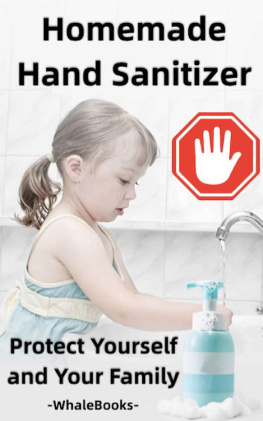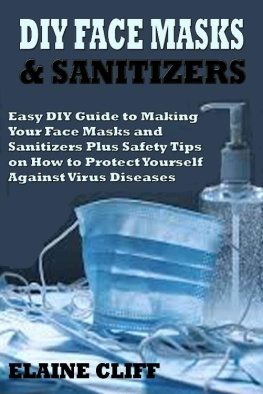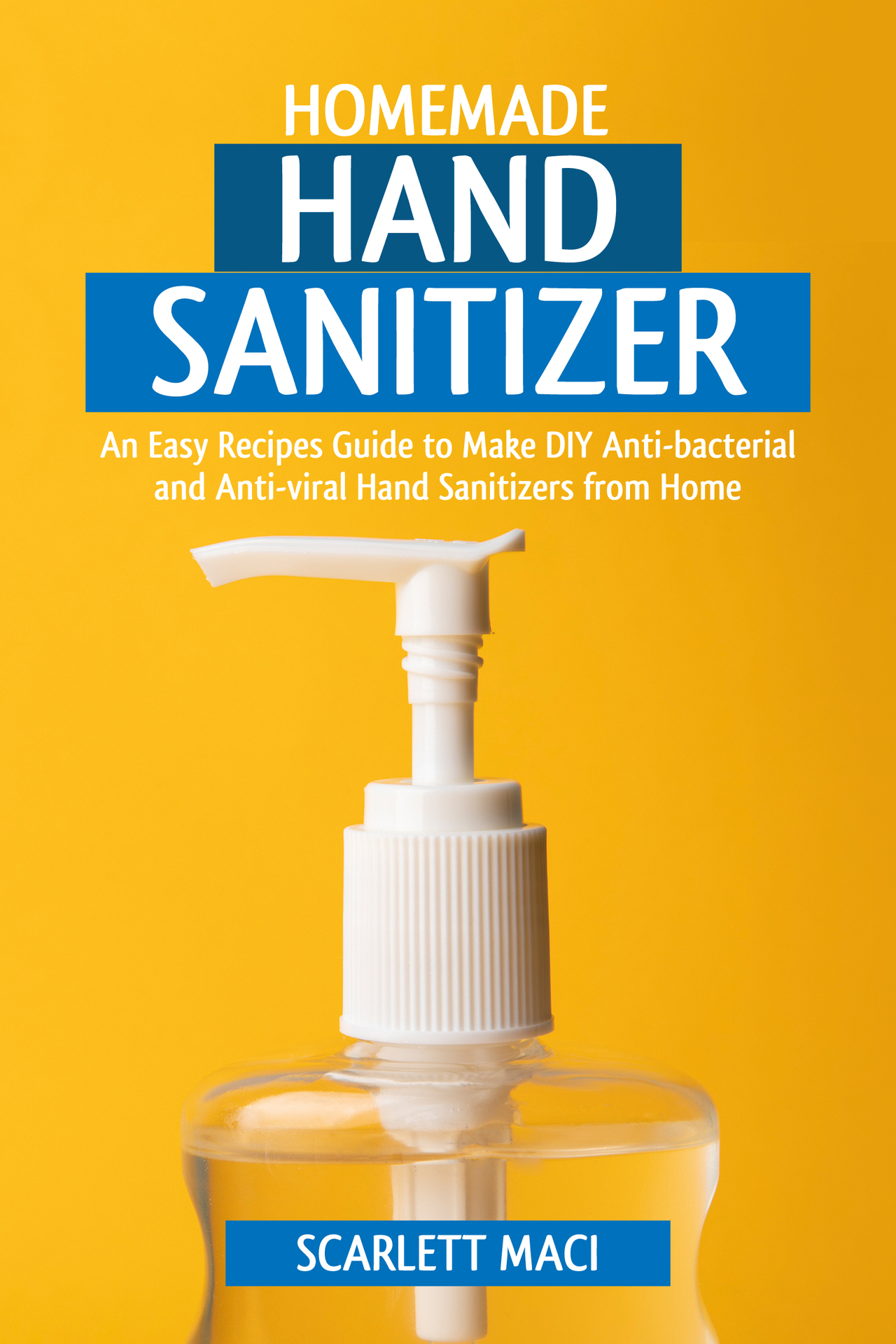HOMEMADE HAND SANITIZER
An easy guide to make DIY Anti-bacterial and Anti-Viral Hand Sanitizers from Home
By
Scarlett Maci
Copyright 2020 by Scarlett Maci- All rights reserved.
This document is geared towards providing exact and reliable information in regards to the topic and issue covered. The publication is sold with the idea that the publisher is not required to render accounting, officially permitted, or otherwise qualified services. If advice is necessary, legal or professional, a practiced individual in the profession should be ordered.
- From a Declaration of Principles which was accepted and approved equally by a Committee of the American Bar Association and a Committee of Publishers and Associations.
In no way is it legal to reproduce, duplicate, or transmit any part of this document in either electronic means or printed format. Recording of this publication is strictly prohibited, and any storage of this document is not allowed unless with written permission from the publisher. All rights reserved.
The information provided herein is stated to be truthful and consistent, in that any liability, in terms of inattention or otherwise, by any usage or abuse of any policies, processes, or directions contained within is the solitary and utter responsibility of the recipient reader. Under no circumstances will any legal responsibility or blame be held against the publisher for any reparation, damages, or monetary loss due to the information herein, either directly or indirectly.
Respective authors own all copyrights not held by the publisher.
The information herein is offered for informational purposes solely and is universal as so. The presentation of the information is without a contract or any guarantee assurance.
The trademarks that are used are without any consent, and the publication of the trademark is without permission or backing by the trademark owner. All trademarks and brands within this book are for clarifying purposes only and are owned by the owners themselves, not affiliated with this document.
Table of Contents
Introduction
Homemade Sanitizers are easy to make products that are essential for cleanliness in today's world. We use the same pair of hands to feed, thereby transmitting the disease through the mouth, and add germs to our body. As we perform our daily duties, holding a clean hand or washing our hands frequently always or after picking up items or eventually placing your hands-on dirty surfaces isn't easy. We also need a safe and secure means, and by using sanitizers, we can have clean hands.
Properly scrubbing your hands with hand sanitizer is one of the best ways to stop the spread of viruses and germs, and to ensure you don't get sick yourself. But if you don't have access to soap and clean water, or if you're out and about and nowhere near a toilet, you're expected to carry hand sanitizer for health safety.
It is easy to make one's hand sanitizer. You've just got to be cautious not to screw things up. Be sure to sanitize the equipment you use for mixing correctly; otherwise, you might contaminate the whole thing. Homemade hand sanitizers are just as successful as anything you're purchasing if you're using the correct amount of alcohol. It is a perfect way to get consumers suffering from price gouging.
The recent pandemic is causing more havoc than our physical health. Our mental health is affected by the fact that people are lined up in stores to buy supplies to prevent the virus from spreading or taking hold first. Distilleries move in to help combat the scarcity of hand sanitizers by using the alcohol in their facilities to make their drug-based alternatives. Some pack it in small bottles while others allow people to carry the refills in their containers.
The shortages and buying restrictions have inspired people to use Facebook, Reddit, Pinterest for recipes, numerous forums, and even a pharmacy to make their hand sanitizer. But just because there are those recipes doesn't mean that you can adopt them.
Next, the Centers for Disease Control recommends that you wash your hands using a hand sanitizer unless you have access to water and soap. Second, experts advise that it's more difficult to make homemade hand sanitizer than it seems. If you don't have the right concentration, experts say you're going to end up with something that isn't successful, or it's too harsh, and that's a waste of ingredients.
There are significant variations between soap and water washing hands and cleaning them with a hand sanitizer. Knowing when to wash your hands and which approach to use will give you the best opportunity to avoid illness.
Chapter 1: Homemade Sanitizers and Their Need
Homemade hand sanitizer provides several advantages over handwashing with soap and water. Most importantly, they require less time than hand washing and are more accessible than sinks. Also, they are less irritating to the skin than soap and water. Some can even improve the condition of the skin.
1.1 Introduction to Hand Sanitizers
In 1966, Lupe Hernandez, a registered nurse in Bakersfield, California, invented the self-made sanitizers. When Hernandez was training to become a nurse, she found that a gel can be used to administer cleaning alcohol so that washing could take place without soap and water. In hand sanitizers, the alcohol destroys the germs and bacteria present on paws.
Hand sanitizer, also called hand antiseptic, hand rub, or hand rubbing agent applied to the hands to kill growing pathogens (organisms that cause disease). Usually, hand sanitizers come in the form of paste, gel, or liquid. Its use is recommended when soap and water are not enough for hand washing or when frequent hand washing interferes with the natural skin barrier (e.g., causing the skin to develop scaling or fissures). Although the efficacy of the hand sanitizer is subjective, it is used in a wide range of settings as a primary means of infection prevention, from daycare centers and schools to hospitals and health care facilities, and from supermarkets to cruise ships.
1.2 Difference Between Sanitizer And Disinfectant
The terms sanitize and disinfect tossed around a lot when you speak or read about cleaning, particularly when you tackle a deep clean. They are also used interchangeably in casual uses, although there is a significant difference between sanitizing and disinfecting. Understanding the difference between the two will influence the items you use to clean and how you use them, and it can mean having a healthier, cleaner position where you need it most.
Sanitization removes a virus or bacteria to a safe level, whereas disinfection destroys anything on a specified surface. Think of sanitizing as lowering germ levels on a surface, while disinfecting destroys them all. Sanitizing is a bit gentler than disinfecting, which can be useful and requires strong chemicals often.
So, when are you supposed to sanitize, and when do you disinfect? Sanitizing is better for surfaces that do not usually encounter highly hazardous bacteria. Those that are left without contact with potent chemicals: think of cooking equipment and food preparation surfaces or toys that children come into near contact with (or even bring into their mouths). Disinfecting is for the significant messes, particularly those that contain body fluids, blood, and the like. You'd clean a toilet or sink in household settings; disinfection is often commonly used in medical settings.
If it comes to choosing sanitizing vs. disinfecting, you'd like to use a more effective disinfecting agent than you would for sanitizing. Water and bleach solutions can be both a sanitizer and a disinfectant (in a lower concentration for the former, in a higher frequency for the latter), and they can be reasonably effective, efficient, so long as you follow the guidelines for contact time. On the other hand, cleaning vinegar is an ordinary cleaner, but it isn't a registered disinfectant or sanitizer, and can't kill dangerous bacteria.




